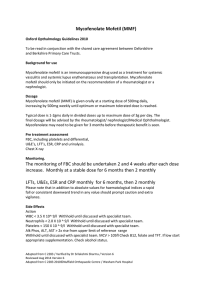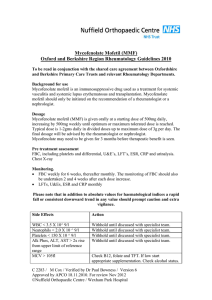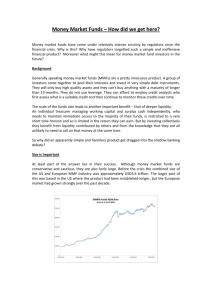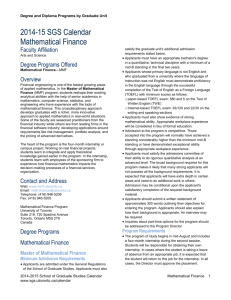Document 11649742
advertisement
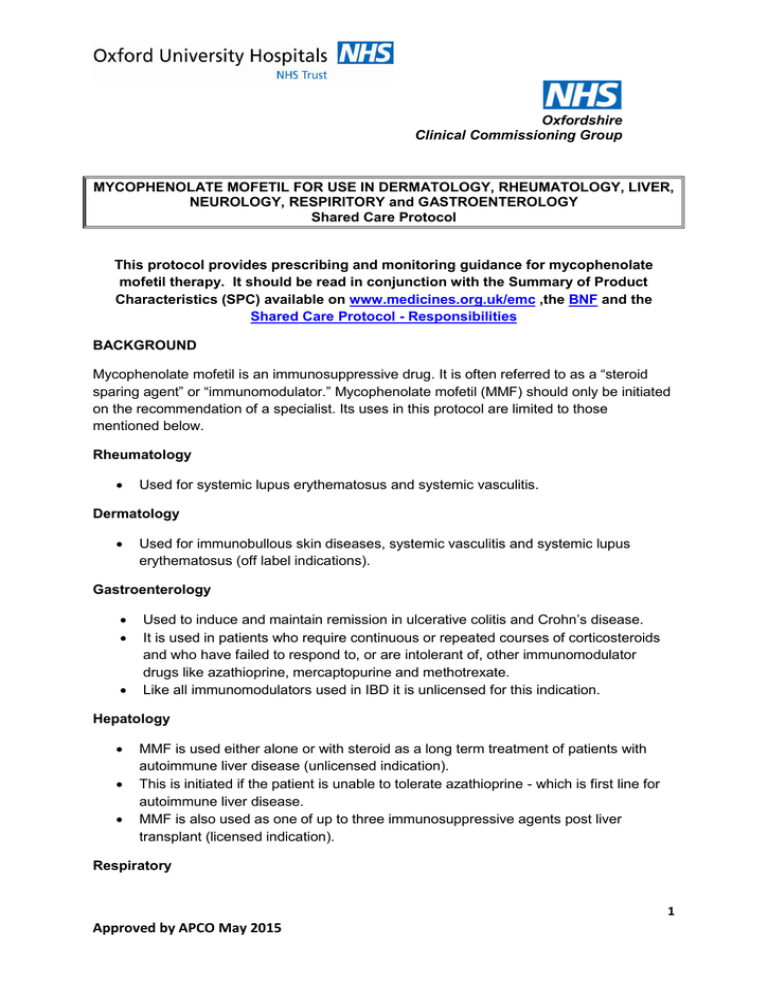
Oxfordshire Clinical Commissioning Group MYCOPHENOLATE MOFETIL FOR USE IN DERMATOLOGY, RHEUMATOLOGY, LIVER, NEUROLOGY, RESPIRITORY and GASTROENTEROLOGY Shared Care Protocol This protocol provides prescribing and monitoring guidance for mycophenolate mofetil therapy. It should be read in conjunction with the Summary of Product Characteristics (SPC) available on www.medicines.org.uk/emc ,the BNF and the Shared Care Protocol - Responsibilities BACKGROUND Mycophenolate mofetil is an immunosuppressive drug. It is often referred to as a “steroid sparing agent” or “immunomodulator.” Mycophenolate mofetil (MMF) should only be initiated on the recommendation of a specialist. Its uses in this protocol are limited to those mentioned below. Rheumatology Used for systemic lupus erythematosus and systemic vasculitis. Dermatology Used for immunobullous skin diseases, systemic vasculitis and systemic lupus erythematosus (off label indications). Gastroenterology Used to induce and maintain remission in ulcerative colitis and Crohn’s disease. It is used in patients who require continuous or repeated courses of corticosteroids and who have failed to respond to, or are intolerant of, other immunomodulator drugs like azathioprine, mercaptopurine and methotrexate. Like all immunomodulators used in IBD it is unlicensed for this indication. Hepatology MMF is used either alone or with steroid as a long term treatment of patients with autoimmune liver disease (unlicensed indication). This is initiated if the patient is unable to tolerate azathioprine - which is first line for autoimmune liver disease. MMF is also used as one of up to three immunosuppressive agents post liver transplant (licensed indication). Respiratory 1 Approved by APCO May 2015 MMF is used in conjunction with prednisolone is a therapeutic option in the interstitial lung diseases, especially those associated with connective tissue disorders or vasculitis MMF is used 2nd line, when first choice disease modifying agents, azathioprine or cyclophosphomide, are not controlling the disease or side effects of these agents are intolerable. Neurology MMF is used as second-line therapy for a range of neurological disorders including myasthenia gravis, inflammatory myopathies and neuropathies, CNS vasculitis and other immune-mediated central and peripheral nervous system diseases (unlicensed indications). For all renal patients, supply of this medication will be provided in secondary care. DOSAGE INDICATION Rheumatology Dermatology Gastroenterology DOSE The starting dose is 500mg daily orally, increasing by 500mg weekly until optimum or maximum tolerated dose is reached. Typical dose is 1-2g daily in divided doses up to maximum dose of 3g per day. MMF is given orally at a starting dose of 500mg once or twice daily, increasing by 500mg weekly until optimum or maximum tolerated dose is reached. Typical dose is 12g daily in divided doses up to maximum dose of 3g per day. The dose of MMF used in IBD is usually between 250mg twice daily and 1g twice daily. Hepatology The dose of MMF used in liver patients is usually between 1 - 1.5g twice daily. Respiratory Starting dose is 500mg daily for the first week, 500mg twice daily for the second week and increased gradually by 500mg each week until the optimum or maximum tolerated dose is reached. Typical dose is 1 – 2g daily in two divided doses. In severe or resistant cases, a maximum of 3g daily in two divided doses may be used. The starting dose is 500mg once daily, increasing after a week to 500mg twice daily. Thereafter, if there are no adverse effects, the usual maintenance dose is 1g twice daily (maximum dose 1.5g twice daily) Neurology 2 Approved by APCO May 2015 PRESCRIBING ADVICE The therapeutic benefit will often be seen after 3 months of therapy. The tablets or capsules should be swallowed whole and not crushed or broken, with or after food. ‘flu vaccination is recommended Supply patient with a PIL when first prescribed PREPERATIONS AVAILABLE 250mg and 500mg tablets and capsules 1g/5ml oral suspension. There is no clinical difference in generic or branded preparations of MMF. It should therefore be prescribed generically. PRE-TREATMENT ASSESMENT FBC, including platelets and differential, U&E’s, LFT’s, CRP and urinalysis. Chest X-ray. A pregnancy test should also be carried out for those who are of child bearing age. ONGOING MONITORING FBC weekly for 6 weeks, thereafter monthly (or when stable consider 3 monthly under specialist recommendation). The monitoring of FBC should also be undertaken 2 and 4 weeks after each dose increase. LFTs, U&Es and CRP monthly Side Effects Action WBC < 3.5 X 10^ 9/l Withhold until discussed with specialist team. Please note that lupus patients and those on steroids often have lymphopenia so often have a normal neutrophil count but total WCC might be low. Neutrophils < 2.0 X 10 ^ 9/l Withhold until discussed with specialist team. Platelets < 150 X 10 ^ 9/l Withhold until discussed with specialist team. Alk Phos, ALT, AST > 2x rise from upper limit of reference range Withhold until discussed with specialist team. GFR< 20mls/min the maximum dose of MMF is 1g BD MCV > 105 Check B12, folate and TFT. If low start appropriate supplementation. Check alcohol status 3 Approved by APCO May 2015 Sterile haematuria / UTI Withhold until discussed with specialist team. Rash Withhold until symptoms clear. Consider re- challenging at a lower dose. If rash recurs stop MMF and discuss with specialist team Oral Ulceration Treat oral ulceration and check FBC. Only stop if neutrophil count is low. Hypersensitivity reactions Fever, malaise, rash, vomiting, muscle/bone pain, dizziness. Stop MMF Nausea, vomiting, diarrhoea Administer tablets after meals to reduce nausea. An anti-emetic or dose reduction may help. If symptoms persist stop MMF Abnormal bruising or sore throat Withhold until FBC result available Malignancy Discuss with specialist team. Please note that in addition to absolute values for haematological indices a rapid fall or consistent downward trend in any value should prompt caution and extra vigilance. NB. Some liver patients with cirrhosis will have pre-existing pancytopenia and lupus patients may have leucopenia because of lymphopenia. CONTRAINDICATIONS AND PRECAUTIONS Pregnancy and breastfeeding Avoid in pregnancy or those trying to conceive. Exercise extreme caution when MMF is used in patients with childbearing potential and in breast feeding mothers. For women, contraceptive advice should be given, as pregnancy should be prevented for a minimum of 6 weeks after discontinuation of treatment. As yet, there is no evidence of adverse fetal/neonatal effects linked to paternal exposure to MMF. Avoid in breast feeding. Vaccination with LIVE vaccines Patients receiving MMF must NOT receive immunization with LIVE vaccines. Inactivated polio is available although sub-optimal response may be 4 Approved by APCO May 2015 seen. Chicken pox /Shingles Patients suffering from chickenpox or active skin lesions in shingles withhold MMF and inform specialist team. Exposure to chickenpox or shingles passive immunization should be carried out using VZIG Alcohol Limit alcohol intake to 12-16 units per week Localised or systemic infections Withhold MMF if patient has a serious infection, including hepatitis B and C and a history of tuberculosis. Patients being treated with MMF are at increased risk for opportunistic infections, fatal infections and sepsis. These infections are often related to a high total immunosuppressive burden and may lead to serious and fatal conditions that physicians should consider in the differential diagnosis in immunosuppressed patients with deteriorating renal function or neurological symptoms. HGPRT Defeciency MMF is an inosine monophosphate dehydrogenase (IMPDH) inhibitor and should be avoided in patients with rare hereditary deficiency of hypoxanthineguanine phosphoribosyl-transferase (HGPRT) such as Lesch-Nyhan and Kelley-Seegmiller syndrome. Sunlight/UV exposure Patients receiving MMF are at increased risk of developing lymphomas and other malignancies, particularly of the skin. Give general advice to minimise risk of skin cancer i.e. patients should wear protective clothing and use a sunscreen with a high protection factor. NSAIDS May be used unless GFR is low. DRUG INTERACTIONS (refer also to BNF and SPC) 5 Approved by APCO May 2015 Antacids and oral magnesium supplements reduce MMF absorption and if required should be separated from MMF by 2-3 hours MMF may reduce the effectiveness of oral contraception Cholestyramine: may decrease the absorption and bioavailability of MMF by 40%. Oral iron may reduce absorption Metronidazole and norfloxacin may reduce bioavailability. Plasma concentration of active metabolites of MMF are reduced by rifampicin. Ciclosporin A – Ciclosporin A pharmacokinetics are unaffected by MMF however, if concomitant ciclosporin treatment is stopped, an increase in plasma concentration of MMF of upto 30% is to be expected. Aciclovir – MMF increases plasma concentration of aciclovir. Plasma concentration of inactive metabolite of MMF increased. Clozapine – can lead to agranulocytosis Phenytoin– reduced absorption of antiepileptic CONTACTS Department Rheumatology Contact Name Helpline SPR on call via switchboard Number 01865 737656 01865 741155 Dermatology Dermatology SR 01865 741155 Gastroenterology Dr Simon Travis Simon.travis@ndm.ox.ac.uk 01865 228753 Dr Satish Keshav Satish.keshav@ndm.ox.ac.uk 01865 228759 Dr Oliver Brain Oliver.brain@ouh.nhs.uk Liver Dr Jane Collier Jane.collier@ouh.nhs.uk Dr Jeremy Cobbold Jeremy.cobbold@ouh.nhs.uk 01865 228757 (01865 71166 bleep 1962) 01865 220967 Hepatology Registrar Sarah Cripps Gastroenterology Pharmacist 01865 71166 bleep 1690 or 1688 01865 71166 bleep 1084 Respiratory Churchill Hospital Dr Rachel Hoyles: Dr Ling-Pei Ho: Dr Henry Bettinson Sarah Poole (Lead Respiratory Pharmacist): 01865 741841 (switchboard) 01865 225223 01865 225223 01865 225234 Bleep 4500 6 Approved by APCO May 2015 Medicines Information 01865 221505 Neurology Consultant Dr David Hilton Jones david.hilton-jones@ndcn.ox.ac.uk 01865 231893 John Radcliffe Hospital Neurology Registrar on call Hospital switchboard Bleep Registrar on call 01865 741166 REFERENCES 1. BNF 68, Sept 2014-Mar 2015 2. EMC, https://www.medicines.org.uk/emc/ Summary of Product Characteristic (SPC) for Cellcept® [Accessed 02/06/2011] 3. Mycophenolate mofetil is safe, well tolerated, and preserves lung function in patients with connective tissue disease-related interstitial lung disease. Swigris et al. Chest 2006 Jul;130(1):30-6. 4. Appendix A In: British Medical Association and Royal Pharmaceutical Society of Great Britain (2011). British National Formulary 60th Edition. BMJ Group and RSP Publishing, London. . 7 Approved by APCO May 2015
